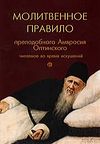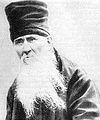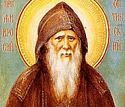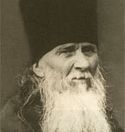

| Previous day | Next day |
| Old Style
June 27
|
Monday |
New Style
July 10
|
|
6th Week after Pentecost.
Tone 4.
Fast of the Holy Apostles. |
Monastic rule: xerophagy (bread, uncooked fruits and vegetables).
|
![]() St. Joanna the Myrrh-bearer (1st c.).
St. Joanna the Myrrh-bearer (1st c.). ![]() St. Sampson the Hospitable, of Constantinople (ca. 530). Uncovering of the relics of Optina Elders Leonid, Macarius, Hilarion, Ambrose, Anatole I, Barsanuphius, and Anatole II (1998).
St. Sampson the Hospitable, of Constantinople (ca. 530). Uncovering of the relics of Optina Elders Leonid, Macarius, Hilarion, Ambrose, Anatole I, Barsanuphius, and Anatole II (1998).
St. Severus, priest, of Interocrea in Italy (6th c.). St. George of the Holy Mountain and Georgia (1065). Blessed Martin of Turov (after 1146). St. Serapion of Kozhaezersk Monastery (1611).
New Hieromartyr Gregory Nikolsky, priest, of Kuban (1918). New Hieromartyr Kirion II, catholicos-patriarch of Georgia (1918).
Hieromartyrs Crescens, Maximus, and Theonest, bishops of Mainz (Germany) (early 5th c.). Martyr Anectus of Caesarea in Cappadocia (304). Martyrdom of Monk Luke (Mukhaidze) of Holy Cross Monastery in Jerusalem (1277). Hieromartyr Pierius, priest, of Antioch.
Thoughts for Each Day of the Year
According to the Daily Church Readings from the Word of God
By St. Theophan the Recluse

Monday. [Rom. 16:17-24; Matt. 13:10-23]
Why do many people not understand discussions about spiritual things? It is due to a thickening of their heart. When their heart is full of attachments to earthly things, it grows coarse, as is said, he grew fat, he grew thick, he waxed broad [Deut. 32:15]. In this state it gravitates downward like a heavy-weight, dragging and chaining the entire soul to the ground, together with the mind. Then, always churning in its circle of low objects, it becomes low in its thought and cannot soar up on high, like a bird weighed down with food. Churning there, it does not see the heavenly, and its entire disposition is against it… Heaven is an alien country to these people. Such a person has nothing within the sum total of his understanding and experience to which he could relate the heavenly, that he might be able to see it if only through a glass darkly [cf. Cor. 13:12]. That is why he won’t try to discuss it, nor does he wish to listen to others discussing it, and he won’t pick up any books written about it. Isn’t this why you’ll often find any number of secular magazines in people’s homes, but not a single spiritual periodical or book—not even the Gospels?
Articles
 St Joanna the Myrrhbearer |
 St Sampson the Hospitable of Constantinople |
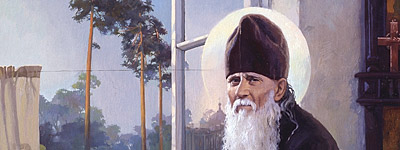 Elder Ambrose of Optina |
 St Severus the Presbyter of Interocrea in Italy |
 Venerable George of Mt. Athos, Georgian |
 Venerable Martin of Turov |
 Venerable Serapion of Kozhe Lake |



